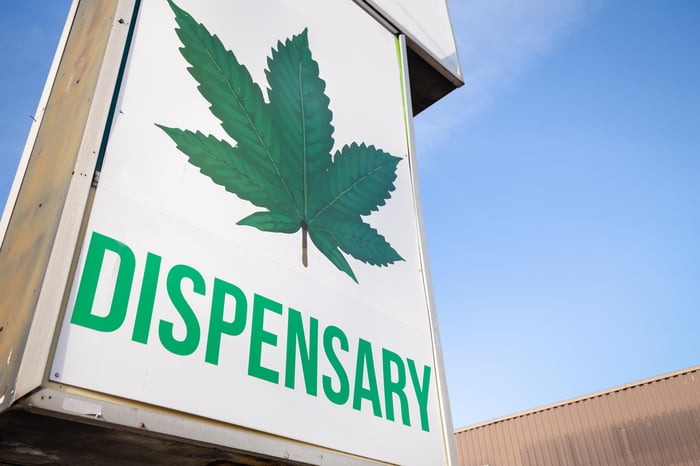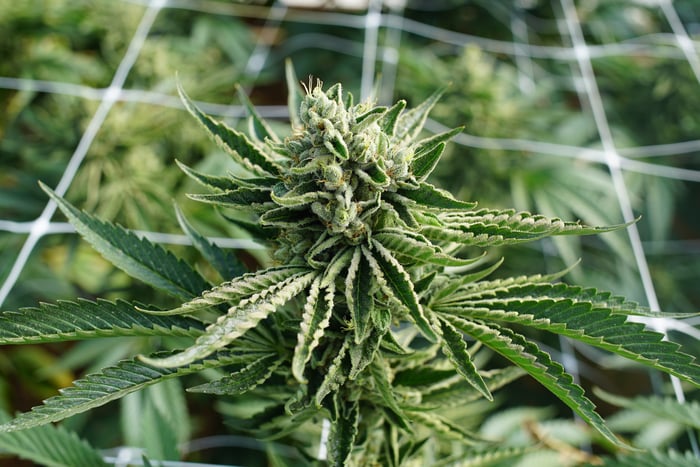It's no secret that the marijuana industry is on fire. Through the first quarter of the year, the very first tradable cannabis exchange-traded fund, the Horizons Marijuana Life Sciences ETF, rose by 54%, leaving the broad-based S&P 500, which is off to its best start to a year since 1991, eating its dust.
Share-based dilution is a big problem for marijuana stock shareholders
But despite these big gains, there aren't any guarantees that investors are going to come out as winners. Sure, there are huge growth expectations with the rollout of legal cannabis in Canada and ongoing state-level legalizations in the United States. However, accessing capital to take advantage of these growth opportunities has left pot stock shareholders at a crossroads.

Image source: Getty Images.
Prior to the passage of the Cannabis Act, marijuana stocks throughout North America had virtually no access to non-dilutive forms of financing, such as secured loans or lines of credit. Instead, if a cannabis business wanted to expand its cultivation capacity, make an acquisition, or develop a new product, it had to raise capital via a bought-deal offering in Canada or a secondary offering in the United States. In layman's terms, we're essentially talking about a publicly traded stock issuing shares, convertible debentures, stock options, and/or warrants in order to raise capital.
The bright side is that bought-deal and secondary offerings pretty much always did the trick. With such robust growth estimates for the pot industry, there's always been demand for these secondary shares. The downside is that these secondary shares have ballooned outstanding share counts, thereby weighing on existing shareholders and making it that much harder for a publicly traded company to turn a meaningful profit.
Make no mistake about it: Practically every marijuana stock has been hit by some degree of share-based dilution, whether it's for organic growth purposes or to finance one or more acquisitions. But there are five pot stocks that've been more painful to own than others as a result of their share-based dilution. Here are five of the worst offenders.

Image source: Getty Images.
iAnthus Capital Holdings
With vertically integrated multistate weed dispensary iAnthus Capital Holdings' (ITHUF -13.54%) stock gaining 182% since Jan. 1, 2018, you'd probably think management is looking out for its shareholders. But the fact of the matter is, iAnthus' acquisition binge and need for capital to open retail stores has led it to issue a lot of stock. Over the past 15 months, its market cap is up about 794%, leading to an underperformance of about 612%!
Arguably the biggest worry with iAnthus isn't that the company is eager to expand its presence into new states (which is pretty much what every vertically integrated dispensary in the U.S. is doing), but rather that it appears to be grossly overpaying for the assets it's acquiring. As of the company's most recent quarterly operating results, 55% of its total assets are tied up in goodwill, and there's no guarantee that this premium paid to acquire other companies will be recouped in the future.
There's no denying that a 182% gain in 15 months is solid. But with iAnthus' share count rising quickly, consider yourself warned that hiccups could be on the horizon.

Image source: Getty Images.
HEXO
Quebec-based HEXO (HEXO) has also seemingly done well for its shareholders, with a return of 108% since Jan. 1, 2018. In that time, HEXO secured a five-year supply deal with its home province of Quebec for an aggregate of 200,000 kilos of production, landed a brand-name partner in Molson Coors Brewing, and last month announced that it was buying Newstrike Brands for 263 million Canadian dollars ($197 million).
Then again, this is a company that raised almost CA$150 million in a bought-deal offering early in 2018, and it's planning to boost its peak annual production capacity to 150,000 kilos from 108,000 kilos with its all-stock purchase of Newstrike. Perhaps it's not surprising, then, that the company's market cap has grown by 463% since the start of 2018, or more than four times more than what the overall share price has gained over that time.
Fundamentally, HEXO looks relatively inexpensive to its peers. It also has quite a bit of its production locked up in supply agreements. But investors should understand that share-based dilution has been common up to this point for HEXO, and that could adversely affect its returns in the interim.

Image source: Getty Images.
Cronos Group
Wall Street's first-quarter darling, Cronos Group (CRON 5.30%), is another pot stock that's been quite liberal with share issuances since the beginning of 2018. The bulk, though, came when tobacco giant Altria closed on a $1.8 billion equity investment in Cronos Group, which pushed its market cap north of $6 billion. Despite its stock rising 140% over the past 15 months, Cronos Group's market cap has galloped higher by 428%.
There's certainly a lot of optimism surrounding Cronos, most of which is tied to its aforementioned partnership with Altria. Now that the company has $1.8 billion in cash, it should be able to execute its long-term strategy of pushing into overseas markets, diversifying its product portfolio away from dried cannabis flower, and perhaps boosting capacity.
But given just how far Cronos has fallen behind its peers in the peak production department, and how little it's done prior to the Altria deal to move into overseas sales channels, the icing on the cake of share-based dilution could keep the company from delivering a meaningful per-share profit for quite some time.

Image source: Getty Images.
MedMen Enterprises
Yet another habitual offender in the share-based dilution department is upscale vertically integrated cannabis company MedMen Enterprises (MMNFF). Since MedMen became a public company last year, its market cap has soared by 239%, but its share price has fallen by 11% for a not-so-pleasant 250% underperformance.
As with iAnthus above, MedMen is having to spend, spend, spend in order to expand into new states. The licensing and permitting process for vertically integrated companies can be long and arduous in each and every legal state, so many have turned to acquiring dispensaries that have already obtained their cultivation and/or sales licenses so as to expedite their entrance into new markets. That could be the impetus behind MedMen's $682 million all-stock purchase of privately held PharmaCann, which should close in 2019. It's unclear if MedMen is overpaying for this deal, but it's a large sum of money that'll be paid entirely by issuing more stock.
At this point, MedMen's existing stores are generating a lot of sales per square foot. But it's going to be quite a while before this company has any shot at profitability, which is something shareholders need to consider.

Image source: Getty Images.
Aurora Cannabis
Lastly, what would a list on share-based dilution be without the prime offender, at least from an aggregate-share perspective? Since the end of fiscal 2014, Aurora Cannabis (ACB 18.47%) has issued more than 1 billion shares, most of which have gone to fund huge acquisitions and a handful of organic cultivation projects. Since the beginning of 2018, Aurora's market cap is up 202%, but its share price has gained only 21%, leading to an underperformance of 181%!
Aurora has funded a number of deals entirely, or predominantly, with its stock in an effort to lead the pack in peak production. With the exception of the more than $800 million CanniMed deal, which had a relatively small cash component, the $2 billion MedReleaf buyout, $200 million ICC Labs deal, and $130 million Whistler Medical Marijuana purchase were all completed by issuing Aurora's common stock.
Worse yet, the carnage isn't over. Aurora had almost 44.2 million stock options and 24.8 million warrants outstanding at the end of calendar year 2018. If and when these shares are exercised, compounded with share-based compensation and whatever other acquisitions Aurora will make moving forward, its outstanding share count will blow past 1.1 billion, if not higher. This could make earning a meaningful profit especially difficult for Canada's biggest producer.





